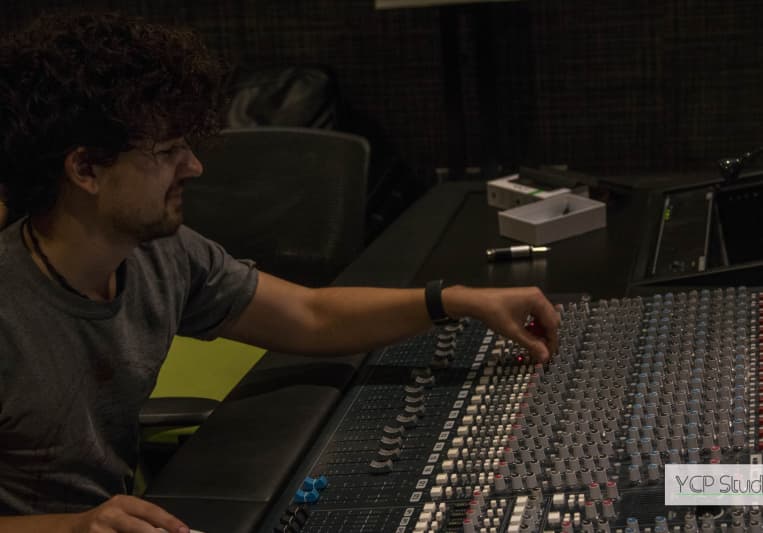
I'm an engineer at Think Loud Studios in York, Pa. Owned and operated by members of the multiplatinum band +LIVE+. I work under grammy nominated producers Grant McFarland and Carson Slovak.
I'm a tracking and mix engineer based out of two studios in York, PA. I can take on clients in various stages of their careers and varying budgets. I have a B.S. in Music Industry and Recording Technology. I am Studio Manager/Chief Engineer at YCP Studios and I am an engineer at Think Loud Studios.
Click the 'Contact' above to get in touch. Looking forward to hearing from you.
Interview with Dan Meyer
Q: What's your 'promise' to your clients?
A: I'll stick with the project and do what it takes to serve the song.
Q: What advice do you have for a customer looking to hire a provider like you?
A: Have a vision. Know what you want and have an effective way of communicating that vision to those you collaborate with.
Q: What type of music do you usually work on?
A: Rock/Metal. Anything with guitars, bass and drums.
Q: What's your strongest skill?
A: My mixing at the moment. My tracking skills are exponentially improving and I've certainly edited my way around some less then ideal recordings to make an artist sound better then they may currently be.
Q: Analog or digital and why?
A: Either really. I learned ITB, but have also been fortunate enough to use some of the very best gear out there. There is a time and place for both in my opinion. They both can sound great if you know what you're doing. I don't believe either to be better then the other, just different.
Q: What do you like most about your job?
A: The creative process. I love getting into the room with an artist I click with and the energy that comes from that. It can be so intimate and I feel like I know my clients better then some people I've know for years.
Q: What questions do you ask prospective clients?
A: What are your goals as an artist? Do you want to be commercially successful or is this just for artistic expression? The better we can define the end goal the fewer issues there will be when it comes to communications and decision making down the line.
Q: What's the biggest misconception about what you do?
A: We aren't wizard. Shit in = Shit out.
Q: What was your career path? How long have you been doing this?
A: I've been interested in audio for the better part of a decade. It became a more serious career path for me in 2012 when I attended the Music Industry and Recording Technology program at York College of Pennsylvania.
Q: Can you share one music production tip?
A: It's a cliche, but GET IT RIGHT AT THE SOURCE. The better your sounds are going in the better your final product will be. Don't paint yourself into a corner early by not taking the time to get things sounding fantastic from the very start. This includes doing your homework in pre pro so that when it's time to record Everyone knows exactly what they need to do to bring the best out.
Q: Tell us about your studio setup.
A: I work at 2 separate studios. One is a medium size studios driven mostly ITB. Some outboard distressors and an Allen & Heath GSR24 console. The console can either be used fully analog, just summing< or essentially be a large interface. I track through the GRS24 pre's. Primary monitors are Focal Be6 twins. The other studio is a multimillion dollar space. The center piece is the SSL duality Console. Monitors are Yamaha NS10s and then a set of big (and very expensive) Ocean Way Speakers. This space is very OTB. We run Neve 1073, API 3124s, Chandler, UA, Avalom and so many other household name units. World renown mixer Tom Lord Algae has worked out of the space before and to quote him, you'll feel like "a kid in a candy shop."
Q: Describe the most common type of work you do for your clients.
A: I work out of multiple studios with different team members at each. One studio I operate as a one man show so I'll usually work with a client from pre pro till the final product. Another I'm part of a team where I could play any role from assistant to producer.

I was the Tracking/Mix Engineer in this production
- Mixing EngineerAverage price - $250 per song
- Recording StudioContact for pricing
- EditingAverage price - $40 per track
- Live drum trackAverage price - $100 per song
- Programmed drumAverage price - $70 per song
- Time alignment - QuantizingAverage price - $40 per track
- Live SoundAverage price - $400 per concert
I typically ask for 50% payment upfront and 50% upon completion before final files are released. I try to keep my turn around to 1.5days/song and one revision per song.
Free test mix



